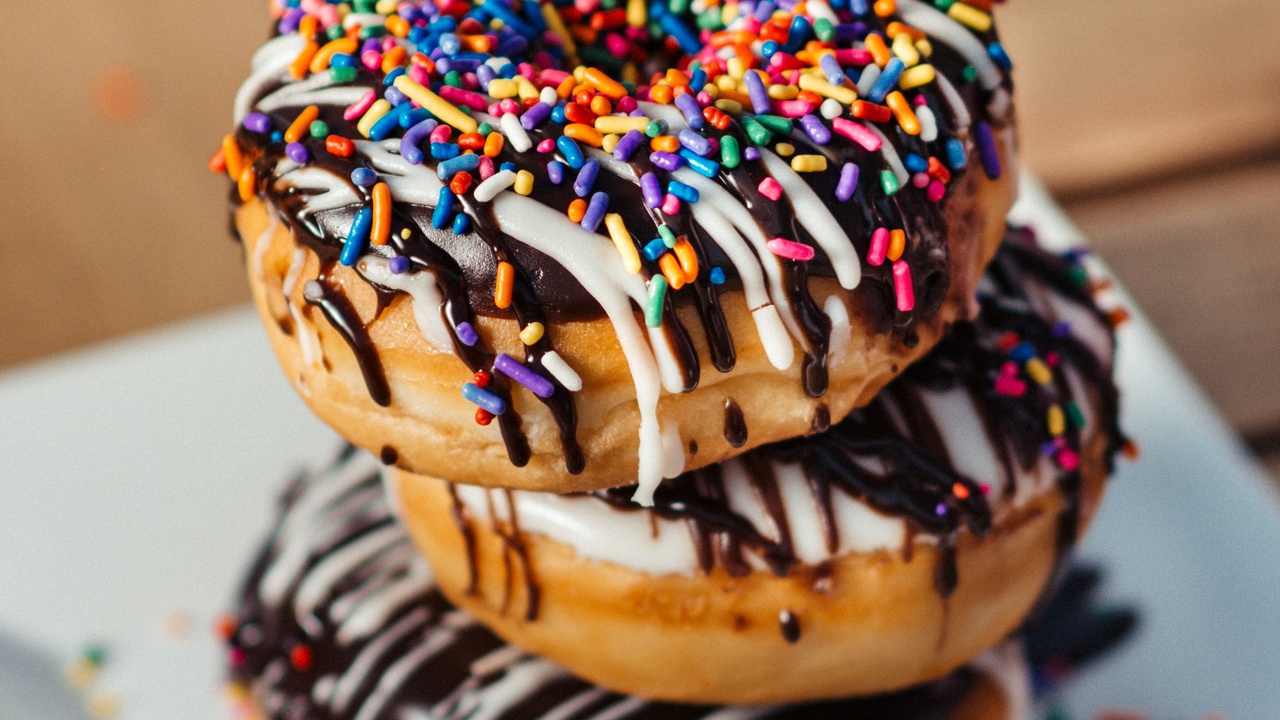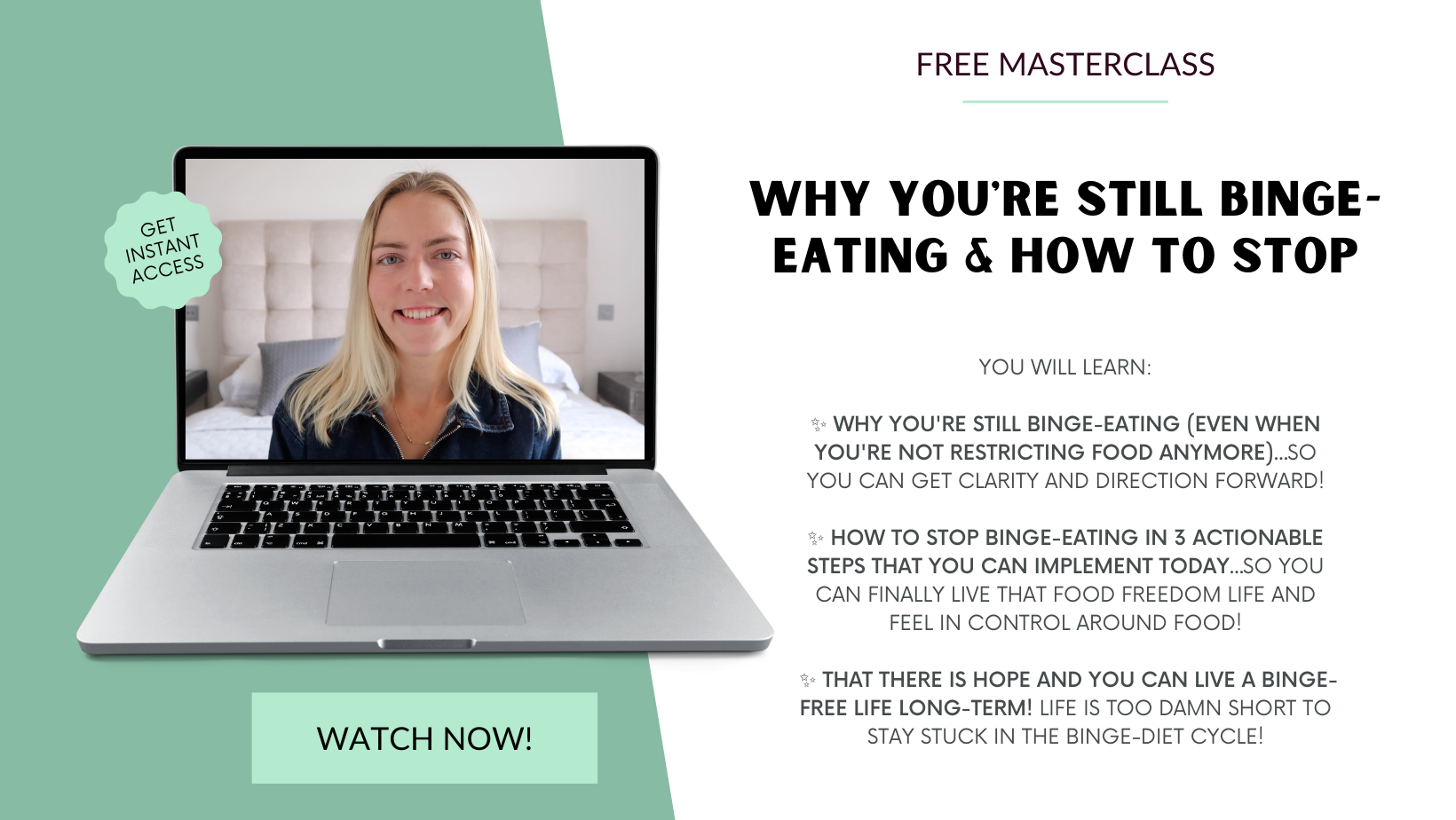6 Reasons Why Food Habituation Is NOT Working For You
Jul 19, 2022
You’ve heard about the wonders that Food Habituation can do for your food relationship and have tried it but it’s just not working. You’ve seen testimonials of women saying they actually have leftovers of their binge food, put it away and then forget it’s in the kitchen. But it just doesn’t feel possible for you…
Let’s talk about it!
WHAT IS FOOD HABITUATION?
Let’s rewind for a second and define Food Habituation. Food habituation is a form of learning where repeated exposure to certain foods help decrease your response to them (i.e. eating). Essentially, you’re habituating yourself to these foods that typically elicit a strong emotional/physical response within you. We’re normalising the foods.
It explains why you get sick of eating the same leftovers all week and you don’t crave that dish for a long time.
The idea is to expose yourself to your binge food often without limits so that it becomes just like any other food. As emotionally charged as an apple!
But what if Food Habituation isn't working for you?
6 REASONS WHY FOOD HABITUATION ISN’T WORKING FOR ME
Let’s go through 6 potential reasons why food habituation isn’t working for you at the moment.
1.YOU’RE STILL RESTRICTING TOO MUCH
If you’re still under-eating all day, then trying to expose yourself to your (probably high-calorie, high-fat, delicious) binge food at night isn’t going to go down well!
In the 30 Day Reboot, I save Food Habituation until about halfway through the course for this reason. It gives students enough time to address the fundamentals of eating enough consistently before diving into something ‘risky’ like Food Habituation.
So look honestly at your food intake and assess whether you need to be eating more food for Food Habituation to work.
2.YOUR BINGE EATING IS CAUSED BY EMOTIONAL REASONS
Food Habituation hinges on the idea that your bingeing/over-eating/food obsession is down to physical or mental restriction. In other words, it assumes your are going to that binge food as a solution to under-eating or perceived restriction. ‘You want what you can’t have’ type of thing!
But if you’re binge-eating to numb difficult emotions like loneliness, grief, anxiety or stress - then exposing yourself to that food probably won’t help things. It’ll just be another opportunity to binge and escape from those confronting emotions.
What do you really need? To learn how to regulate your emotions and move through them - definitely recommend checking out this video on How To NOT Binge Eat Emotionally.
3.YOU’RE NOT SETTING YOURSELF UP FOR SUCCESS
Food Habituation can be scary! Diving headfirst into it can often lead to ‘failure’ (binge-eating). It can be game-changing to start small and build up from there. Here are some tips to make things easier:
- Don’t start with your most triggering food - Following on from the previous tip, we also don’t want to overwhelm you by making you jump in the deep end with your biggest trigger / binge food. Make a list of all the foods you’d like to normalise and start with the one that feels least emotionally intense for you.
- Eat with other people - Many people binge in secrecy alone. So add a safety net in as you delve into Food Habituation by eating in front of other people. You’re less likely to end up bingeing on the food. Plus it helps to normalise that food as something you can eat with other people - it’s not something ‘bad’ that can only be enjoyed without judgement of others.
- Eat at ‘safe’ times of day - Similar to who you eat with, focus on when you eat as well. Think about when you feel most out-of-control with your list of foods. Evening is probably a triggering time (it is for many people) and morning / lunch is likely to feel more ‘safe’. Really set yourself up for success with Food Habituation by starting to eat that food at times of the day you rarely binge / overeat. This will help you have more ‘successful’ Food Habituation experiences and therefore be more likely to continue with this process. The more successful moments you can have, the more confidence and self-trust you’ll build as well.
- Pair your binge foods with ‘safe’ foods - Again, we’re setting you up for success here. Instead of trying to normalise your binge food by eating it on its own, combine it with foods that feel totally normal to you. For example, if you’re trying to feel more in control with Nutella, pair it with some strawberries or bananas (assuming those feel ‘safe’ to you).
4. YOU’RE NOT GIVING YOURSELF ‘TRUE’ UNCONDITIONAL PERMISSION
Food Habituation is so scary that oftentimes people kind of do it half-in half-out. They tell themselves they can have the cookies but only take 2 and then put the packet away.
Or they let themselves go all in on the cake but then guilt themselves afterwards. Or promise they’ll allow the pasta but ‘in moderation’.
It’s important when practicing Food Habituation to give yourself TRUE full permission. No judging, no guilting, no limits.
5. TRYING TO NORMALISE ALL BINGE FOOD AT ONCE
Food Habituation can feel daunting for someone who has lost any ounce of self-trust with themselves around food. It’s scary to suddenly stock your kitchen with tons of ALL of your ‘fear’ foods. The last thing we want is to overwhelm you, fill you with anxiety, and lead to a freak out where you lose any belief in Food Habituation.
So start small - focus on buying one binge food. Go from there.
Also, exposing yourself to all of your binge foods at once goes against the science of habituation. Habituation works better when you focus on one food until it loses novelty. If you spread your efforts at once, it means each food still has some novelty. So go one at a time.
6. NOT GIVING IT ENOUGH TIME
Food Habituation always feels like a ‘failure’ at the start. You will binge on the food. It’s part of the process. If you didn’t binge, it probably means the food isn’t that emotionally charged for you and you don’t even need to be habituating to it anyway!
So give yourself enough time. Be patient. It WILL get easier. Before you know it, you’ll forget the brownies are even in the kitchen!
WHAT IF I BINGE WHEN TRYING FOOD HABITUATION?
It’s probable that Food Habituation won’t work the very first time. It’s a process. There will be ups and downs. So what do you do if you ‘mess up’?
- Acknowledge that it’s part of the process - You didn’t start binge-eating overnight and similarly it won’t disappear overnight either.
- Learn from the ‘mess up’ - Did you jump in too fast with Food Habituation? Had you not eaten enough food that day anyway so ended up bingeing because of that? Could you try a less intense binge food first instead? Identify what may have caused the slip up and rectify it next time. It’s all an iterative process of learning.
- Notice your progress! It’s easy to focus on things going wrong, but what keeps motivation up is tracking and reporting progress. So do that!
If you’d like more help with the Food Habituation process, learn all about it in my 30 Day Reboot online course. The course has helped over 450 women already stop binge-eating and improve their food relationship.
With Love,
Bríd
Start your food and body healing journey with the FREE masterclass
"Why You're Still Binge-Eating & How To Stop"


